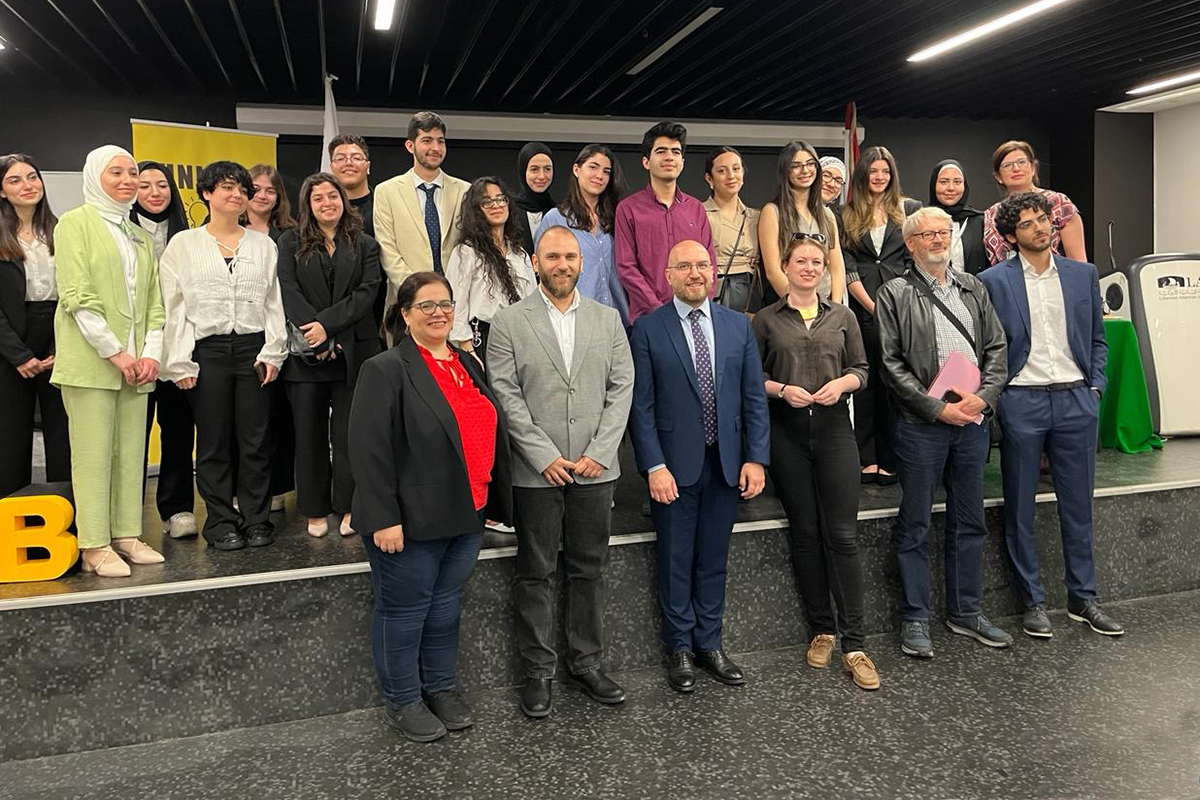LAU Brings Back National Public Speaking Competition for Centennial
University students from across Lebanon develop their public speaking skills and contribute to a culture promoting open dialogue.
In a notable comeback for LAU’s Centennial after a five-year hiatus, the National Public Speaking Competition sparked renewed enthusiasm among university students in its 19th edition for the year 2024.
On April 6, LAU’s Department of Communication, Arts and Languages in collaboration with the English-Speaking Union (ESU) Lebanon Chapter—a Lebanese NGO that works with young people and their teachers to improve oracy skills and cross-cultural understanding—attracted 11 universities from across Lebanon to recognize the value of public speaking in today’s world.
Each university sent two contestants to compete under the theme “There is nothing either good or bad but thinking makes it so,” quoting Hamlet from William Shakespeare’s tragedy of the same name. The theme was selected for its emphasis on individual agency in interpreting the outcome of personal and global events and choosing to dwell on them or move forward.
“A multilayered theme is selected every year that one may interpret in so many different ways,” said Instructor Nayiri Baboudjian, who has worked with and trained students for such competitions. “A lot of students either go very philosophical or have a more personal approach, but the core idea remains centered on how these interpretations are reflected in a public demonstration and setting.”
The decision to revive the competition was driven by a growing emphasis on a holistic education that surpasses traditional classroom learning. University students, in particular, stand to benefit from honing their public speaking abilities, as effective communication is vital in various fields, including academia, business and leadership roles.
“By participating in such competitions,” added Baboudjian, “students can sharpen their articulation and critical thinking. It encourages them to step out of their comfort zones to not only express their ideas confidently but also engage in meaningful dialogue on a range of topics.”
According to Senior Instructor Mona Shahine—who is also an ESU executive member—the competition’s revival is a reflection of the university’s efforts to act as a hub of intellectual discourse and academic excellence, especially in light of Lebanon’s economic challenges and the worldwide impact of the COVID-19 pandemic during which the public speaking scene declined.
“It underscores the institution’s commitment to nurturing talent and fostering creativity, most specifically in promoting a culture of free expression and open dialogue,” she said. “This is great in attracting talented students and strengthening partnerships with external stakeholders.”
LAU has been hosting this event for over a decade, added Shahine, and has always brought in a jury consisting of high-profile members, this year marked by the British Embassy’s Political Advisor and Director of Politics and Economics Department Olivia Campbell, British Journalist and Middle East Correspondent for the BBC based in Lebanon Jim Muir, Lebanon’s Country Director of the Munathara Initiative Paul Abi Ishac, and Author/TV Personality and LAU Communication Arts alumnus Zaven Kouyoumdjian (BA ’92).
For LAU sophomore biology student Tala Jardali, who placed first, the competition helped her “relive the experience of public speaking and break the stigma around STEM majors when it comes to being involved in extracurricular activities,” she said, stressing the importance of constantly reminding students that university life is much more than just academic pressure.
In her speech “The Freedom to Choose Joy,” she questioned whether individuals can free themselves from life’s burdens, drawing inspiration from philosophy and contrasting Aristotle’s pursuit of happiness through virtue ethics with Schopenhauer’s pessimistic view of aimless suffering to highlight how differing perspectives influence one’s outlook on life.
LAU junior psychology student Batoul Zalzale, who placed second in the in-house competition, spoke of the confidence the experience gave her, as the thought of being on stage and presenting to strangers took courage. “It taught me not to be afraid to push myself because I have a lot to offer,” she said. “It was a way for me to be optimistic and to look at things from a more positive perspective.”

